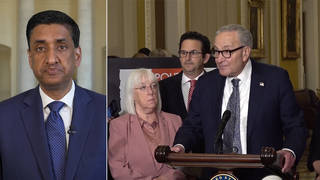
Guests
- Ralph Naderlongtime consumer advocate and former presidential candidate.
- Medea BenjaminPeace activist and founder of CODEPINK. She just returned from a week-long citizen diplomacy mission to Iran. She met with advisers to Iranian President Mahmoud Ahmadinejad, two women Parliament members, NGO leaders and women’s groups.
Links
We speak with longtime consumer advocate and former presidential candidate Ralph Nader and with activist Medea Benjamin, founder of CODEPINK, about President-elect Barack Obama’s cabinet selections and how the antiwar and social justice movements will organize under an Obama administration. [includes rush transcript]
Transcript
AMY GOODMAN: I want to stay with Ralph Nader. We’re also joined by Medea Benjamin, longtime grassroots activist and founder of the group CODEPINK, just returned from a week-long citizen diplomacy mission to Iran, where she met with advisers to the Iranian president, two women Parliament members, NGO leaders and women’s groups. And I want to talk with both of you about the cabinet picks. Juan and I have some questions, starting with Ralph Nader. Just go through the cabinet picks — again, they have to be approved — of Barack Obama, your, well, former opponent. You ran for president, as well, Ralph Nader.
RALPH NADER: Well, it’s symbolized in an article in the newspapers a day or two ago. The headline was “Obama Turns to Consider Liberals for Cabinet Positions.” I mean, you know, after appointing all the heavyweights, keeping Gates as Secretary of Defense, Hillary Clinton at State Department, and other positions — Treasury, for example, coming from Wall Street — the article said, well, it’s time now to consider some liberal appointees.
Well, what’s left? Department of Labor. Now, will David Bonior, who is a genuine progressive and spent many years in the House of Representatives from Michigan, get the job? That remains to be seen.
It’s really interesting. As long as liberals and progressives gave Obama a pass during the election and didn’t demand anything in return, he knew that he had their votes and he had their support regardless and moved right, moved to the corporate. And that’s reflected in the appointments that he has been putting in place.
Now we look forward to the second level. Who’s going to be Food and Drug Administration head? Who’s going to be the head of the Auto Safety Agency or EPA? Will so-called liberals and progressives get their share of the Obama administration at that second level? It remains to be seen. But the signs are not very auspicious.
JUAN GONZALEZ: Well, the New York Times
was reporting today that he may name California Congressman Javier Becerra to be the US trade representative, and Becerra has been a critic of free trade agreements in the past. But, in general, have you been surprised by the number of former Clinton administration officials that he has named?
RALPH NADER: Who hasn’t? You know, he defeated Hillary Clinton in a close race, and now he’s reinstalling the Bill Clinton administration. Now, there are two interpretations, briefly, here. One, it could reflect his insecurity. That way, by putting Clintonites all over the government and keeping Gates, he is basically eliminating a lot of potential centers of criticism and challenge to his administration after January 20.
The second interpretation is more benign, and that is that he wants to elevate the State Department, so it isn’t dominated by the Defense Department and the security apparatus, and push for a more benign foreign policy, with more vigorous diplomacy instead of brute force, more attention to infectious diseases, environmental issues, land erosion, agricultural cooperatives, etc., which are much cheaper than ballooning a huge wasteful military budget. And if that is his goal, then the fact that he’s put Gates there for at least a year means that there isn’t a new Secretary of Defense to build up a powerful base to dominate State Department, and putting Hillary, who’s a world-recognized figure, regardless of her policies, into State Department, which will elevate the State Department. That’s the more benign approach. But we’ll see how it plays out.
AMY GOODMAN: What about Marine General Jim Jones nominated as National Security Adviser? Interestingly, President Bush’s first National Security Adviser, of course, was Condoleezza Rice. She came from the board of Chevron. That’s exactly where Marine General Jim Jones comes from. Jim Jones comes from Chevron and the board of Boeing and the chief executive of the US Chamber of Commerce’s Institute for 21st Century Energy, which has been criticized by environmental groups for, among other things, calling for the immediate expansion of domestic oil and gas production and issuing reports that challenge the use of the Clean Air Act to combat global warming.
RALPH NADER: Well, Jim Jones is basically the representative of what President Eisenhower cautioned us about, the military-industrial complex. He is experienced. He’s clever. And now he’s in the White House. So the question is, who’s going to run what? Is Obama going to transform Jim Jones? Is Obama going to transform all these establishment appointees? Or are they going to, in effect, transform him, in contrast to his more liberal rhetoric?
It’s very hard to appoint people with fixed opinions, fixed constituencies around the country of vested power, and say, well, we’re going to use these to change America, because if they change, that will give great credibility, and that will offset the corporate power structure from Washington, D.C. You know, that’s never been done before, Amy. Usually, when you appoint people who have fixed positions, who have experience in set ways, who represent the power structure, they’re not about to be steered into a progressive path of hope and change by someone at the top in the Oval Office.
JUAN GONZALEZ: Well, Medea, you’ve just returned — Medea Benjamin, you’ve just returned from Iran and with conversations with various people in the Iranian government and civil society. What’s your sense of how they’re viewing the Obama presidency and what it holds in store for them?
MEDEA BENJAMIN: They’re very cautious. The young people were excited about Barack Obama; the political leaders, not so. They say, “We’re not really interested in words and talk about hope and change. We want to see some real change in policy. We are concerned,” they tell us, “about the Secretary of State, about Hillary Clinton, about Rahm Emanuel, about several other of the people that are advising the President-elect.”
They look at people like Dennis Ross, who said recently in a Newsweek article that the Bush administration wasn’t doing enough to push Iran. There are a group of people that are surrounding Barack Obama that have said that sanctions should be tightened, are talking about a naval blockade that would stop oil exports from leaving Iran and would stop refined petroleum products from going into Iran. It would be absolutely disastrous for the Iranian people.
So they’re very concerned, and rightly so. And that’s why we in the progressive movement have to stake out our positions very clearly. We have to say that Barack Obama promised direct talks without preconditions. We want those talks to happen. And rather than a tightening of the sanction, we want a lifting of the sanctions.
AMY GOODMAN: Medea Benjamin, this issue of organizing, I mean, maybe Barack Obama modeled it — although I think the figures have come out for the amount of money he spent on this campaign. We were closing in, I think, on a billion dollars. Was it $750 million?
MEDEA BENJAMIN: $750 million.
AMY GOODMAN: But the other aspect is the remarkable community organizing, which might be a model now for people to take up critiquing his policies. But you are well known for being co-founder of Global Exchange and now CODEPINK. You’re moving to Washington completely to continue your work, not in the Bush administration, but in the Obama administration. Why? What are you going to do? How are you mobilizing?
MEDEA BENJAMIN: We feel like this is the moment for us as organizers. Yesterday, there were 2,000 organizers that were brought into Washington, D.C., many of them coming from the community organization where Barack Obama was trained in Chicago, talking about how we have to be there to push this administration forward. Groups are planning, January, February, bringing thousands of people to Washington, and also to be a part of this ten million email list that has been created.
In fact, today they sent out a message from Barack Obama’s people saying we want you to organize house parties December 13th and 14th to give us your ideas, and it’s called “Change Is Coming.” We tell progressives go to those meetings, whether you voted for Ralph Nader, Cynthia McKinney or Barack Obama. Go to those meetings and be part of this community that’s going to have the ear of this new administration. You can go to my.barackobama.com/changeiscoming, find out where the events are, create ones in your own community, and, you know, essentially, have progressives infiltrate this vast network of organizers.
AMY GOODMAN: Do you have any sense you’ll have the ear of the administration?
MEDEA BENJAMIN: We have people we know that have been appointed or are advisers. I mean, we’re excited that some people with some progressive views are going to be in this administration. We have friends who are moving to Washington to take lower-level positions. And we feel like we cannot give up and say, just because we don’t like the cabinet positions, we don’t like a lot of the people he’s appointed, that we’re going to say, OK, you know, he’s already betrayed us. No, no. We’ve got to get in there and be in there from day one.
We’re even part of organizing an inaugural peace ball on the day of the inauguration that sold out in one week, a thousand people — Amy Goodman is going to be there; I hope Juan will be there — to say peace is on the agenda. We’re going to be at the airports. We’re going to be at Union Station in Washington, D.C. when people arrive to the inauguration with quotes of Barack Obama and other people saying, you know, this is what he stood for. He stood for getting the troops out of Iraq. He stood for talks without preconditions. We’re going to remind people as they come in that this is what we’re hoping will happen.
AMY GOODMAN: And how will you deal with Afghanistan? He supports a surge in Afghanistan.
MEDEA BENJAMIN: Afghanistan is one promise we don’t want him to fulfill. And we have to get out there very quickly, and we are building up as a peace movement to take on the issue of Afghanistan to say that this is not a, quote, “good war,” that this has to be a negotiated solution, and that we want to get our troops out of Afghanistan.
More than that, Amy, we have to start taking on the Pentagon budget. Barney Frank came out recently and said cut the Pentagon budget by 25 percent. That’s a great way to start. Let’s put our support behind that and say, let’s close down these bases that we have overseas. Let’s take the $10 billion that we’re spending on the war in Iraq and Afghanistan, use them for domestic purposes, and let’s start reining in the empire.
AMY GOODMAN: Well, Juan, last comment?
JUAN GONZALEZ: I just wanted to ask Ralph Nader about the dangers, the potential dangers that occur in periods when there are political shifts like this and progressives come to office. What happens in terms of the popular movement and the dangers that the popular movement faces in these times of change?
RALPH NADER: Well, they do have to mobilize, as Medea said, I mean, mobilize in the streets and marches and pressure on members of Congress. The issue now moves to Congress. That’s where the action is going to be on healthcare, that’s going to be on issues of war and peace, constitutionalism, etc. So that definitely is the case.
But it certainly would have eased the mission of progressives all over the country had they conditioned their support of Obama in return for certain concessions and certain recognitions in policy before the election, rather than just wait until after the election, when he’s draped around himself corporate and other establishment figures from the national security apparatus and the Wall Street apparatus. So it’s an uphill fight, but there’s no alternative.
I mean, there’s got to now — basically say, OK, Barack, you gave us a lot of rhetoric, hope and change, change and hope, and it’s time to produce. And that’s what people have to do in every congressional district. We’re looking at november5.org, the website, to invite people to see whether they want to form Congress action groups in congressional districts to focus, for example, on single-payer healthcare, which has ninety-five members of the House already supporting the Conyers bill, HR 676.
So, it is mobilization time. And the hope, of course, is like Nixon opened up relations with China. The Democrats couldn’t do it, because they were concerned of being accused of being soft on communism. So maybe Barack Obama’s corporate establishment can be steered in that direction.
AMY GOODMAN: Ralph Nader, we want to thank you for being with us.
RALPH NADER: Only if Obama is a transforming leader.
AMY GOODMAN: Thank you very much for being with us, longtime consumer advocate, also former presidential candidate. His first book that catapulted him to fame, Unsafe at Any Speed, that took on the auto industry. Medea Benjamin, co-founder of CODEPINK, moving to Washington for this administration.
MEDEA BENJAMIN: Thank you. And can I just add, come to Washington on a regular basis, go to the hearings. If we pack those hearings, the people’s voices will be inside of Congress. And contact us at CODEPINK. We have a house. You can come and stay there.
AMY GOODMAN: Your website?
MEDEA BENJAMIN: codepinkalert.org.
AMY GOODMAN: This is Democracy Now!, democracynow.org, the War and Peace Report. When we come back, what happened in Nigeria earlier this week, the killings of perhaps 400 people, then the The Blogging Revolution. Stay with us.












Media Options